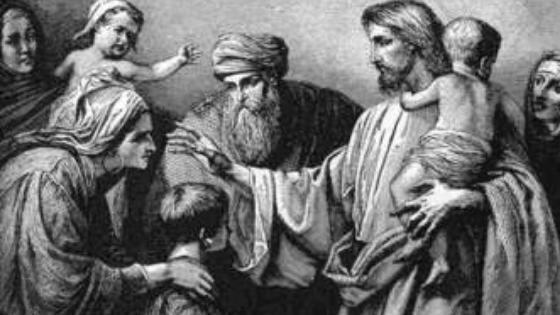The Sunday Liturgy Commentary
The 25th Sunday of Ordinary Time – 23rd January 2018
Lectionary readings: Wisdom 2:12,17-20; Psalm 54:3-8; James 3:16-4:3; Mark 9:30-37
Download
 Presented in the form of a diatribe against another, the pericope from the book of Wisdom that forms our first reading today is in the form of a Hellenistic diatribe against another, is part of a larger section (Wis 2:10-20). It presents the thoughts of the “ungodly”, who “revel in sensual pleasures” 2:6-9, “exploit the weak” 2:10-1 and in this portion “persecute the righteous unto death” 2:12-20 (New Interpreter’s Bible, 559).
Presented in the form of a diatribe against another, the pericope from the book of Wisdom that forms our first reading today is in the form of a Hellenistic diatribe against another, is part of a larger section (Wis 2:10-20). It presents the thoughts of the “ungodly”, who “revel in sensual pleasures” 2:6-9, “exploit the weak” 2:10-1 and in this portion “persecute the righteous unto death” 2:12-20 (New Interpreter’s Bible, 559).
Arthur Green (These Are the Words, Kindle locations 3066-3067) notes of the “righteous one”, or Tsaddik, as performing extraordinary acts of “generosity and selflessness within the human community.” The tsaddik in this section of Wisdom is described as “God’s child” (v. 18), an image we shall return to in the Gospel.
The reading from James is also better understood within its context as part of a longer pericope (Jas 3:13-17) that draws a contrast between earthly and heavenly wisdom (Martin, 136) and is followed by similar discourse about the nature of conflicts and disputes (4:1-10).
Envy and selfish ambition (v. 16) are presented as causes of disharmony, whilst wisdom from above is presented as “pure, then peaceable, gentle, willing to yield, full of mercy and good fruits, without a trace of partiality or hypocrisy” (v. 17). Further, righteousness will yield peace, which draws heavily from the imagery of Isaiah (32:17).
The conflicts and disputes of Jas 4:1 and the gospel passage (cf. Mark 9:31,33-34), echo the Hebrew maḥloket, which Arthur Green describes as the opposite of shalom. “Shalom means living in harmony with one another; maḥloket means division, sometimes leading to hostility, between people. (Kindle locations 2941-2943).
Herbert Basser (JANT, 637), suggests that “humanity wants to do God’s will but self-aggrandizement and Roman oppression prevent it. The early church faced numerous conflicts created by factionalism.” Perhaps we are seeing echoes of this both in the passages from James and Mark’s gospel.
Today’s gospel presents the second prediction of the fate that Jesus would face in Jerusalem (9:31). The disciples cannot comprehend what Jesus is speaking of (v 32), which is highlighted by the fact that they end up arguing over which one of them is the greatest (v. 34), which is perhaps also an echo of the maḥloket alluded to in James. Jesus, then offers two examples that highlight the desirable qualities that should be exhibited by a disciple.
The directive that those who seek to be first must in fact place themselves last and be servant of all, stands in the face of the worldly wisdom we have seen in the first and second readings. In order to further emphasize this, Jesus holds up the child as an example of one who, at the time, held a “secondary status” as a “lesser human” (JANT, 637). One who welcomes a child (v. 37), therefore, is indeed placing themselves last. In addition to this, one who in humility welcomes a child, also welcomes Jesus.
For Reflection and Discussion: What place does humility have in my life? How might adopting the disposition of a tzaddik enable cohesion and peace in our communities and in our world?
Bibliography: Herbert Basser, James, & Lawrence M. Mills, Mark, The Jewish Annotated New Testament (New York: Oxford University Press, 2011); Arthur Green, These Are the Words, Second Edition: A Vocabulary of Jewish Spiritual Life Jewish Lights Publishing, 2012. Kindle Edition; Ralph P. Martin, James, Word Biblical Commentary, 48 (Grand Rapids, MI: Zondervan, 1988); Walter T. Wilson, The Wisdom of Solomon, New Interpreter’s Bible: One-Volume Commentary (Nashville: Abingdon Press, 2010).
This week’s teaching commentary was prepared by
Mark David Walsh, B.A., B. Theol. Grad. Dip. R.E., Grad. Dip. Theol., M.R.E., Australia,
Bat Kol alum ‘01, ‘02, ’04, ‘13
Email address: markdavidwalsh@gmail.com
[Copyright © 2018]
………………………………………………………………
PLEASE NOTE: The weekly Gospel commentaries represent the research and creative thought of their authors, and are meant to stimulate deeper thinking about the meaning of the Sunday Scriptures. While they draw upon the study methods and sources employed by the Bat Kol Institute, the views and conclusions expressed in these commentaries are solely those of their authors, and do not necessarily represent the views of Bat Kol. Questions, comments and feedback are always welcome.
……………………………………………………………
Bat Kol Institute for Jewish Studies, Jerusalem
1983-2018
“Christians Studying the Bible within its Jewish milieu, using Jewish Sources.”
Mail to: gill@batkol.info; Website: www.batkol.info



